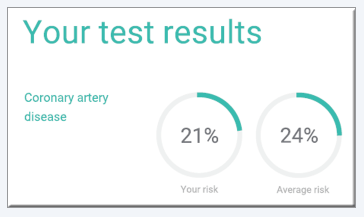About our test

A full list of diseases covered
Lupus
Graves' Disease
Celiac Disease
Multiple Sclerosis
Psoriasis
Intracranial aneurysm
Atrial fibrillation
Heart disease
Peripheral arterial disease
Venous thromboembolism
Macular degeneration (not tested at the moment)
Alzheimer's disease
Rheumatoid arthritis
Osteoporosis
Obesity
Migraine
Type 1 diabetes
Type 2 diabetes
Alopecia
Gallstones
Sugar consumption
Folate metabolism
Vitamin B6 metabolism
Vitamin B12 metabolism
Vitamin D metabolism
Bladder cancer
Breast cancer
Colorectal cancer
Gastric cancer
Lung cancer
Prostate cancer
Skin cancer
Basal cell carcinoma
Open-angle glaucoma
Exfoliation glaucoma
So how exactly is a genetic health test going to help me?
Imagine you discover you have a high probability of developing heart disease. You should know that certain life style trends can contribute to the development of the disease, especially your diet, habits and your exercise routine. Heart disease for example, is caused by a build-up of fatty deposits which result from high fat diets, being overweight, a lack of exercise as well as smoking. These can all help precipitate the illness. If you knew you were at elevated risk, genetically speaking, of heart disease, wouldn’t you want to take more control of the factors that could possibly precipitate the illness?
Let’s take another example – the result of your genetic predisposition test shows you have a very high predisposition to lung cancer. The correlation between smoking and lung cancer is stronger than with any other disease. What better incentive to quit the habit then knowing that you in particular stand a very high chance of getting the disease?
Breast cancer – Angelina Jolie had a double mastectomy following the results of her genetic predisposition test which showed she was at a very elevated risk of breast cancer. Whilst a high genetic risk does not in any way mean one will develop the disease, it can help you take certain preventive measures – even just ensuring you have regular breast checks and mammograms.
And one last example: celiac disease. You might have been celiac for years and never had any major symptoms which made you link your intake of gluten to the symptoms themselves. In other words, you might be an undiagnosed celiac sufferer and thus, unknowingly increasing your risk of developing gastric cancer.
Well genetic health testing will help you take your health into your own hands. With the help of expert nutritionists and dieticians you can come up with the right eating plan and way of life that will help you maximize your health and well-being.
The many diseases you can discover
Our test traces a total 34 hereditary illnesses which we classify into the following categories.
Immune diseases: immune diseases are those diseases which specifically target the immune system. Many times these diseases mean that the immune system turns against itself, targeting its own tissue and organs. An example of such a condition is multiple sclerosis in which the immune system targets its very own nerve cells resulting in pain and muscle spasms (amongst many other symptoms) for the sufferer.
Celiac disease is another example of an immune disease which is normally quite difficult to diagnose because of the vast range of symptoms associated with it. People who suffer from celiac disease and who continue consuming non gluten free products increase their chances of developing gastrointestinal cancer by at least 15%
Cardiovascular diseases: these are a group of diseases directly affecting the heart and the heart vessels. A genetic health test can easily tell you the likelihood that you will develop conditions such as Atrial fibrillation (which is characterized by a very irregular heart beat) and heart disease (a condition in which the blood vessels that supply oxygen and blood to the heart constrict reducing the bloody supply). Heart disease is a leading cause of death in the United States.
Ageing diseases: The most well known in this category are Alzheimer’s dementia and rheumatoid arthritis. Arthritis can be prevented by doing regular physical activity and stretching exercises which avoid the joints remaining in fixed positions for long periods. Moreover, the right doses of calcium and vitamin E are indispensable for a strong musculoskeletal system. Alzheimer’s unfortunately cannot be prevented but an early diagnosis is crucial to slowing progression of the disease.
Cancers: Breast cancer, lung cancer and prostate cancer are amongst the cancers tested for in a genetic health test.
General Health: In this category we have conditions such as obesity and diabetes.
Ocular diseases: Ocular diseases refer to diseases of the eyes.
Our glossary of terms
We have compiled a glossary with many useful terms related to genetics, genes and many other relevant terminology and jargon. View our genetic glossary.
 CUSTOMER SERVICE AWARD WINNER
CUSTOMER SERVICE AWARD WINNER